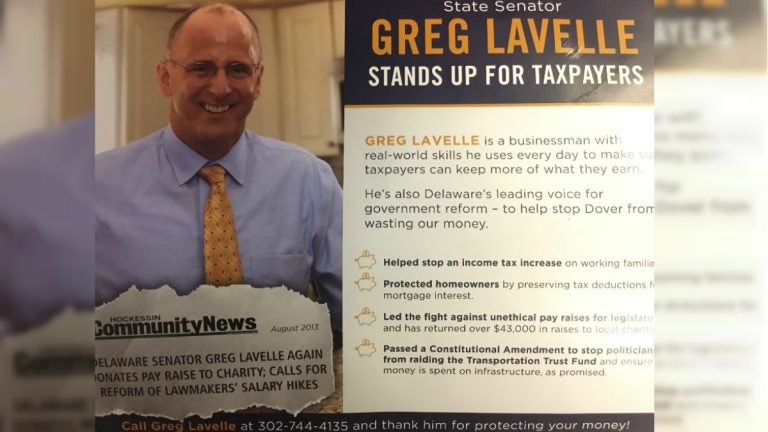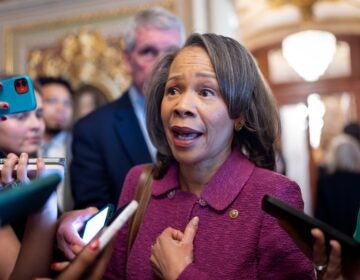Delaware Dems accuse two GOP politicians of election law violations
Republican candidates for state Senate, treasurer coordinate campaigns with political action committees, Democratic Party alleges.

Republican Delaware state Sen. Greg Lavelle says this campaign mailer from First State First PAC is an "issue advocacy" piece. Democrats accuse Lavelle of illegally coordinating electioneering with the PAC. (Mark Eichmann/WHYY)
Delaware Democrats are accusing two Republican candidates of violating state election law by coordinating campaigns with political action committees.
A mailer sent to residents of Republican state Sen. Greg Lavelle’s district praises Lavelle as a friend of the environment and someone who fought against tax increases. But the flyer stops short of telling recipients to vote for Lavelle. Instead, it encourages calls to the senator to thank him. The mailer was not sent by Lavelle’s campaign, but from the First State First, a political action committee for which Lavelle serves as treasurer.
Delaware Democratic Party executive director Jesse Chadderdon said the mailer violates the state campaign laws. “These things are being done to circumvent the rules and contribution limits and other things that the public relies on to make sure that the elections are fair,” he said.
State Democratic Party chairman Erik Raser-Schramm sent a complaint about the advertisements to the state election commissioner.
“We are specifically concerned about improper coordination between his campaign and First State First, the political action committee of which he is the treasurer and which uses his home address,” Raser-Schramm wrote. “We are so troubled by what appears to be a clear disregard for the law.”
Lavelle, who denied any impropriety, said it’s legal for him to coordinate with the PAC for these mailers because they’re a form of “issue advocacy.”
“They don’t say ‘vote for,’ they don’t say the election is on a particular day. It’s issue advocacy, which is permitted under law,” he said. “It’s as simple as that.”
“If you’re going to argue that these are issue advocacy pieces, then why did you file campaign finance reports as if they were electioneering pieces?” Chadderdon said in response to Lavelle’s defense.
While PACs are not allowed to coordinate “electioneering” messages with campaigns, before 2012 PACs were able to circumvent finance disclosures of their advocacy for candidates by avoiding phrases such as “vote for Smith” in their advertising.
But in 2012, then-Gov. Jack Markell signed legislation designed to close that loophole. The law now states that “third-party advertisements that refer to a clearly identified candidate and are publicly distributed within 30 days before a primary or special election, or 60 days before a general election” are subject to the state’s disclosure requirements.
Lavelle said the PAC is a way for him to be able to compete against a much better funded Democratic Party. He called the complaint a way for the opposing party to generate news stories.
“What they actually get is two stories, so they’ll get this story, and then they’ll get the decision from the election commissioner, which will just put it back in the public. It’s all politics, no substance,” he said.
The Democratic complaint also takes issue with Republican state Treasurer Ken Simpler over his re-election bid. Raser-Schramm accused Simpler of using his campaign funds to sponsor an advertisement produced by the Foundation for Delaware’s Future PAC on his campaign’s Facebook page. Much like the Lavelle ad, the PAC advertisement doesn’t ask viewers to vote for Simpler, but urges them to call his office with their support.
“That means the Simpler campaign is directly spending resources that makes it unavoidable that state employees will have to engage in electioneering on state time, even against their will.” Raser-Schramm said.
He also accused the PAC of failing to file third-party advocacy reports with the Department of Elections.
Simpler did not return WHYY’s request for comment.
WHYY is your source for fact-based, in-depth journalism and information. As a nonprofit organization, we rely on financial support from readers like you. Please give today.





